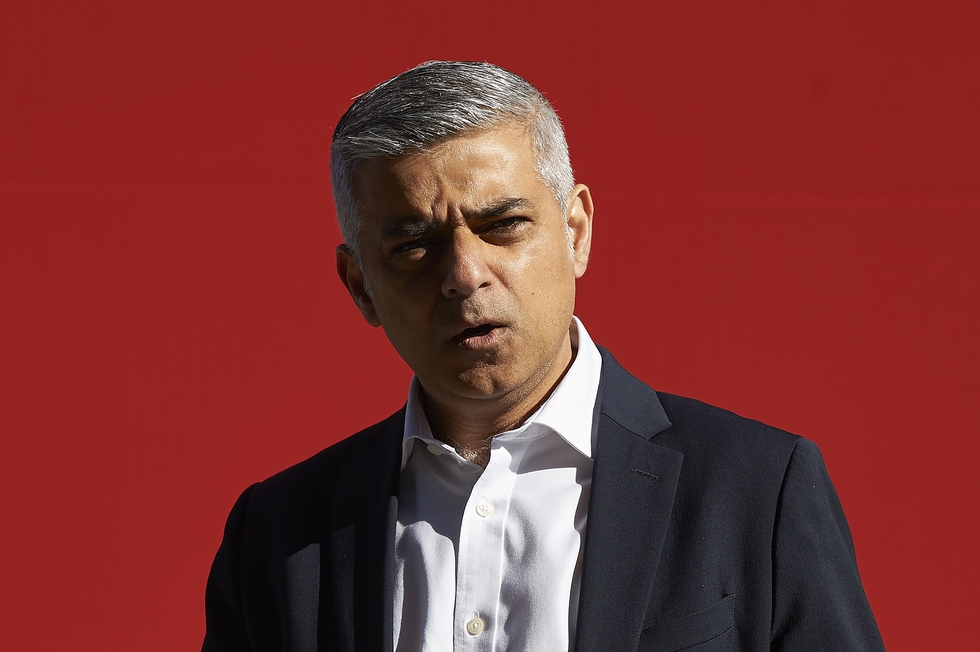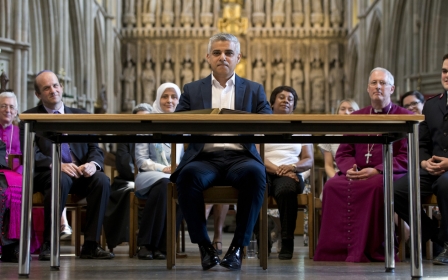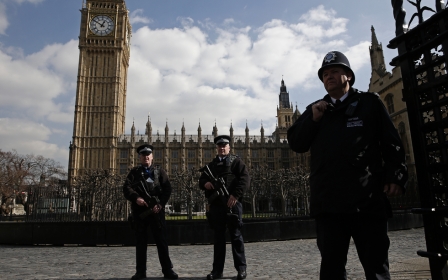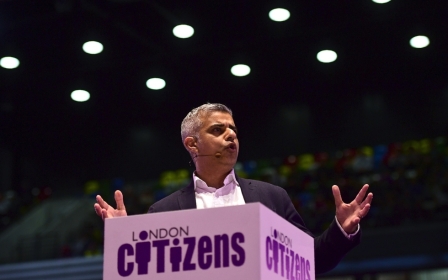In praise of London: Reconciliation with imperial legacy

In the year in which the ruler of Syria pledged to destroy one of the most beautiful cities of the East and one of the world’s most ancient metropolises; in which Syrians were banished and scattered around the world; in which Europe recoiled before the waves of refugees who flee war and death; in which a US presidential candidate called for banning Muslims from entering America and for monitoring those who live there; in which the cities of the European continent witnessed demonstrations and discrimination against Muslims: in that same year a Muslim lawyer and a member of parliament, a son of an immigrant family, won power in one of the most divisive election campaigns ever. He became the mayor of London, one of the world's most important cities.
Sadiq Khan could not be considered a radical Labour politician, compared with Labour Party leader Jeremy Corbyn or with London’s former mayor Ken Livingstone. Nor is he known for supporting Muslim causes or championing the rights of the oppressed. Khan never planned for, and he definitely did not desire, his religious identity to be an election issue.
However, his installation as mayor of the British capital is not without significance.
This is the first Muslim to be elected mayor of the most influential city in Western Europe. He won more than 1.3 million votes, with a comfortable margin over his Conservative Party opponent, Zac Goldsmith. His electoral mandate is one of the biggest achieved by a British politician. Indeed, it exceeds that of both of his predecessors, Labour’s Livingstone and the Conservative Boris Johnson.
Considering the Labour Party's losses in Scotland, this win by the party’s candidate in London constitutes a significant morale boost. There is no doubt that Sadiq Khan tried throughout his election campaign to distance himself from his party leader, who does stir up anxieties among British voters. He concentrated his campaign on the big issues facing the city, on the concerns of its inhabitants and not on issues of national politics. Yet, his success was ultimately also a success for the current party leadership. If his victory did not put an end to plots to unseat Corbyn as party leader, at the very least it postponed them.
The significance of Khan’s victory at the social level is even greater.
Society in Britain is class based. Notwithstanding the tangible decline during the past few decades in the role the social background plays in the country's political and economic/financial life, class continues to play a major role in the success or failure of individuals. The present Conservative government, for instance, is known as the product of the British public school. Compared with the US, where the meritocracy of the ''American dream'' is supposed to count for more than the wealth of families, it is still difficult in Britain for working-class children to cross class and social borders.
These criteria do not necessarily apply to the Labour Party. Yet, Khan did not win a seat in a constituency known for its leftist leanings. He won power in a huge and highly diversified city. In this sense, the victory of Khan, who was born to an immigrant family headed by a father who worked as a bus driver and a mother who worked as a tailor, points to an important fact: Britain is changing and is continuing to change.
Yet, the real meaning of Khan’s victory lies in London itself. This is a city of 8.5 million inhabitants who speak around 300 languages; 60 percent of them are described as white, 18 percent are Asians, 13 percent are black, 1.3 percent are Arabs, 5 percent are of mixed races and the remaining 2 percent belong to other racial backgrounds. Voting for Khan was in fact a vote for London itself, and his victory was in essence a victory for London.
Traditionally, the Conservative Party's election machine is known not to refrain from using any means, whether ethical or unethical, in order to accomplish the objective of winning. In recent years, the Party gave voters the impression that it had become more pious in its political battles. However, in the London mayoral election battle the Conservatives unleashed their election machine which went ahead without restraint.
Goldsmith was not the only one embroiled in the ugly defamation campaign against Khan. Wide sectors of the party leadership and activists, including Prime Minister David Cameron himself, were also embroiled. Khan was described as friend of the terrorists who sympathise with the Islamic State group. He was accused of antisemitism. Furthermore, the Conservatives’ election machine tried to use his Islamic identity in order to divide Asian voters and stir up the fears of non-Muslims.
London was born nearly 2,000 ago as a Roman colony in the aftermath of the Roman invasion of Britain in the year 43 AD. But Roman London was confined to what is today known as the City, or the financial district, which is not bigger than three square kilometres. In subsequent centuries, especially since the Normandy era in the 11th century, London started acquiring its features, particularly following the construction of Westminster’s first palace.
But it was not until the Theodorian age in the 16th century, and the vast expansion in the city’s borders, that London was transformed to become one of Britain’s biggest and most important cities. The mercantile age added a new dimension to the city as commercial centre, whether for internal or external trade. Then the industrial revolution arrived toward the end of the 18th and the beginning of the 19th century, bolstering its financial/economic position and adding to its political role within the United Kingdom a highly influential cultural role.
Yet, present-day London is, to a large degree, the product of the empire. There are, of course, cities, and there are empire cities. And this, par excellence, is an empire city. It was made and protected by the colonial surplus of the empire and with the efforts of the people of the colonies. Its streets and squares boast of the statues and monuments of builders of the empire.
When the great plague swept across between 1665 and 1666, the population of London did not exceed half a million. The plague wiped out one-fifth of the population. That was a low point. Then, during the imperial ascendancy from 1831 to 1925 London became the world’s greatest city.
In the aftermath of the Second World War, the empire started shrinking. Yet, amid the prerequisites of rebuilding in the '50s and '60s, Britain opened its doors for newcomers from the former properties of the empire. Caribbeans, Indians and Pakistanis came in their hundreds of thousands to operate the railway services and factories in the Midlands and in the north of the country.
Even the Irish, who had been coming since the Irish famine in the middle of the 19th century, did not stop their migration to the fascinating and tough city, which always packaged opportunity within the loss of humane empathy.
During the past 10 years, and in the wake of the expansion of the European Union, the city received varying numbers of citizens from East European states. In addition to those, London never ceased to provide shelter for political refugees from all Arab, Asian and Latin American countries whenever the military in this or that country decided to topple election legitimacy or when tyrannical leaders unleashed a new wave of repression against their people.
During the past two decades, and in spite of the voices of the conservative right, which go loud from time to time, including the rise of the UK Independence Party (UKIP) and racist far-right groups, not to mention terrorist attacks, London seemed to reconcile itself with its imperial legacy.
In London alone, and this is something you do not find in any other city, you go to a restaurant that is owned by an Arab and in which the service is provided by young men from Eastern Europe and whose book-keeper is an Indian. In London alone, the city of 43 universities, you will find students from around the world filling halls and lecture rooms or you will find them in the British Archive Centre researching the histories of their own countries, which is somehow the history of the empire itself.
This self-reconciling London has refused to surrender to the fear that the Conservative Party’s election machine tried to sow in the hearts of London’s citizens. The city opted to vote for the son of Pakistani.
- Basheer Nafi is a senior research fellow at Al Jazeera Centre for Studies.
The views expressed in this article belong to the author and do not necessarily reflect the editorial policy of Middle East Eye.
Photo: Britain's new London Mayor, Sadiq Khan, during an election campaign on 5 May, 2016 (AFP).
New MEE newsletter: Jerusalem Dispatch
Sign up to get the latest insights and analysis on Israel-Palestine, alongside Turkey Unpacked and other MEE newsletters
Middle East Eye delivers independent and unrivalled coverage and analysis of the Middle East, North Africa and beyond. To learn more about republishing this content and the associated fees, please fill out this form. More about MEE can be found here.





